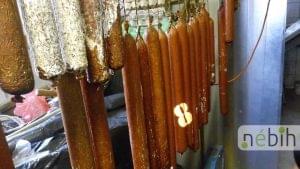Together with the police, Nébih raided the illegal food producer
In November 2022, inspectors of the National Food Chain Safety Office (Nébih) raided an illegal food producer in Pest County in cooperation with the police. Many species of animals were illegally kept on the site without notification, without meeting the animal health and epidemic prevention requirements. Illegal cutting, processing and smoking were carried out on the property, also in irregularly arranged conditions, in shocking hygienic conditions.

On-site photo of the raid (Photo: Nébih)
The inspectors of Nébih were faced with conditions that were seriously illegal, objectionable from the point of view of animal health, epidemiology and hygiene, and which put even the professionals to the test at a location in Pest County. In cooperation with the police, the experts of the office carried out an inspection on a property located in a high-risk area from the point of view of African swine fever. The inspectors already found numerous violations of the law in relation to the animals kept on the property (cattle, pigs, sheep, poultry). Among other things, neither the required documentation nor the animal health information were available for the farm animals that were kept illegally without notification, and the pigs and sheep were also unmarked. The decomposing cattle head in the yard, while the animal remains in the manure included intestines.
The problem was serious in several areas
The unknown animal health status in itself represents a serious epidemiological and food safety risk, however, during the inspection, it was revealed that several other activities were carried out illegally on the property. Slaughter, contract slaughter, meat processing, production of meat products, smoking and contract smoking took place in shockingly hygienic conditions. The person concerned carried out his entire activity irregularly, as he did not have the necessary official license or registration for food production. He did not keep any of the prescribed documentation, so traceability, one of the basic requirements of food safety, was not met. The inspectors also found a plucking machine, a cauldron, a rack with meat hooks, and a brick smoker in the yard. Other parts of the property included a rusty, dirty sausage filling machine and a large meat grinder. During the inspection, sausages were being made in the smokehouse. The experts also found rotting, smelly pork in a 120-liter plastic waste container, according to the inspector, the product being marinated may have deteriorated. The part of the building used for food production itself was unclean, dirty, and untidy. Even basic hygiene conditions such as hygienic hand washing facilities were not adequately provided on the property.
Due to the serious and multiple violations of animal health and food chain safety, Nébih immediately orders traffic restrictions on all individuals of the livestock during the inspection. The infringing food items found on the spot were taken off the market with immediate effect, their placing on the market and their use was prohibited, and they were placed under official lock-up.
Nébih initiated official proceedings against the person concerned. The procedure and the determination of the fine are ongoing.
The data of the person concerned is available in the infringement list.
Photo and video recordings taken during the inspection are available on Nébih’s website.
https://portal.nebih.gov.hu/-/rendorseggel-kozosen-csappott-le-a-nebih-az-illegalis-elelmiszer-eloallitora
Related news
The risk of introduction is increasing – the Japanese beetle has already appeared in Croatia
🎧 Hallgasd a cikket: Lejátszás Szünet Folytatás Leállítás Nyelv: Auto…
Read more >Increased risk of avian influenza
🎧 Hallgasd a cikket: Lejátszás Szünet Folytatás Leállítás Nyelv: Auto…
Read more >Related news
Not only are interest rates falling, but terms are also lengthening for personal loans
🎧 Hallgasd a cikket: Lejátszás Szünet Folytatás Leállítás Nyelv: Auto…
Read more >







